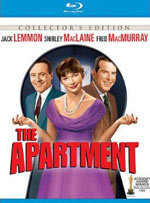
The Apartment

Director: Billy Wilder
Starring: Jack Lemmon, Shirley MacLaine, Fred MacMurray, Ray Walston
Running Time: 2 hours, 5 minutes
Theatrical Release Date: June 15, 1960
Blu-Ray Release Date: January 24, 2012 (Amazon.com)
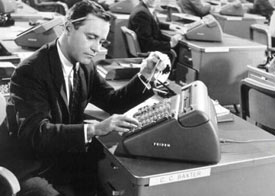
Plot Summary
C.C. Baxter (Jack Lemmon) knows the way to success in business…it’s through the door of his apartment! By providing a perfect hideaway for philandering bosses, the ambitious young employee reaps a series of undeserved promotions. But when Bud lends the key to big boss J.D. Sheldrake (Fred MacMurray), he not only advances his career, but his own love life as well. For Sheldrake’s mistress is the lovely Fran Kubelik (Shirley MacLaine), elevator girl and angel of Bud’s dreams. Convinced that he is the only man for Fran, Bud must make the most important executive decision of his career: lose the girl…or his job. (from 20th Century FOX)
Film Review
I believe the first time I had seen Jack Lemmon in a film, it was either “Mr. Roberts” or Some Like It Hot–two fantastic films that Lemmon really shines in. It’s because of these films that I’ve seen the title The Apartment, have known very little about it, and had never gotten the chance to actually watch it. When a copy of the blu-ray disc crossed my path, I was excited to finally get the chance to see this classic movie.
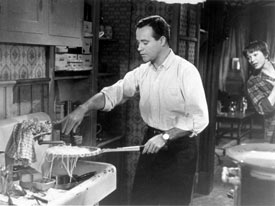
The truth is: I’m naive when it comes to classic movies. Despite all my love for, and interest in, movies since my childhood, I’m far from a film historian. My family introduced me to family-friendly classics when I was younger and through my teen years, so I have this rose-colored view of “old movies” being clean and wholesome. However, it was around the late fifties/early sixties that movies began really to make a change. You can thank filmmakers like Hitchcock for pushing the envelope when it came to violence and even some senusality, but Billy Wilder, who directed one of the best comedies of all time with Some Like It Hot, was one of the first directors to really continue to push the limits of what was acceptable in the realm of sexual content in films. By today’s Hollywood standards, The Apartment would be considered tame and maybe even sterilized, but truth be told, as-is, The Apartment most likely would fly under a rating of PG-13 if it were to be released in 2012.
I was quite surprised to find the plot revolving around Lemmon’s C.C. Baxter, a peon at the bottom of the corporate ladder who, when we meet him, is already in the thick of being manipulated by higher-ups who want to borrow his apartment on a regular basis to use it for having affairs in. When that’s what it looked like was happening in the opening scenes of the film, I was in disbelief. The entire film is based on the plot that Baxter’s being played like a puppet for the use of his apartment by wealthy married men who want a little action on the side. If the film was made today, it’d easily be a raunchy PG-13 or even R–depending on how much the filmmakers decide to show. For 1960, The Apartment was pretty racy without having to show anything explicit. Still, affairs are constantly happening around Baxter and are even more frequently talked about. Morally, The Apartment is a mess. It’s one of those movies that has a good story hidden beneath a layer of icky plot elements, and with good performances making it worth watching from an acting standpoint, but there isn’t a wholesome character in the bunch (save for Baxter’s faithfully married physician neighbor who turns out to be the only voice of reason in the film). It seems like every character is either in the midst of having an affair or has had one in the past. Infidelity and adultery is commonplace in this film in a way that, in some measure, is meant to be over-the-top on purpose, but Wilder does make sure not to glamourize this lifestyle too much. Along the way, we see the consequences of nearly everyone’s actions involved in the seedy behavior, and Baxter is forced to “man up” and stop demoralizing himself for the sake of his career.
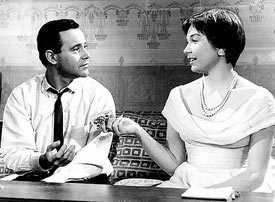
It’s probably just as surprising as it’s not that The Apartment won Best Picture (among other awards) at the Oscars in its time. It’s one of those controversial films that the Academy seems to adore, but it’s also a quirky mix of comedy and drama that also seems to get a lot of attention. Lemmon plays Baxter quite serious at times, while other times he seems like just a fun, happy-go-lucky bachelor. But Lemmon pulls off the weasley Baxter in a way that few actors can. You need Baxter to be likeable in a role like this, since he’s an enabler for infidelity from his co-workers (who, admittedly, would just find somewhere else to mess around if they didn’t have his place). Basically, he’s a man who needs to grow up and realize what he’s doing is wrong, and that process doesn’t begin until he starts to fall for a woman in his building who he soon discovers is the mistress of his boss, Mr. Sheldrake… who is using his apartment as a rendezvous point. When Sheldrake continues to string along this woman, she actually decides to overdose on sleeping pills found in Baxter’s medicine cabinet in the apartment, and C.C. finds her afterwards passed out when he returns home. It’s a daring move by Wilder to make an attempted suicide a big piece of The Apartment, but it adds weight to the repercussions of such extramarrital affairs. It also forces Baxter to open his eyes to the severity of the actions of men like Sheldrake, who let their professional power trickle down to the way they treat women.
It’s performances like those from Lemmon and actress Shirley MacLaine (who plays Ms. Fran Kubelik), coupled with character development that is commendable, that make The Apartment an entertaining film despite its subject matter. Still, it’s tough to get past the fact that Baxter is allowing such ugly actions to take place at his home, even if it is just so he can keep his job, but the pay-off is when he finally does step up. The content for The Apartment is surprisingly rough for an older movie like this one. While there are no sexual encounters actually shown, much is implied, and there’s a considerable amount of innuendo. I was also surprised to hear a little bit of mild profanity in this as well, including 3 “h*ll,” 2 “d*mn” and two uses of “G-d.” There’s just a little bit of violence (Baxter sees some westerns on TV while flipping through the channels, and a man is punched in the face in another scene), with the worst of it being a character trying to commit suicide with sleeping pills, but it’s the overall subject matter of the film that is its biggest problem.
The Apartment may have been dubbed the crowning achievement in 1960 by the Academy Awards, but from a grander viewpoint, the film paints a sad portrait of the corporate world and how manipulative men in positions of power can be. While The Apartment certainly has its moments, it’s not one of those films that is easily recommendable. And with better, more overall-entertaining movies out there worth watching, it doesn’t make it too difficult to suggest not stopping by this Apartment.
– John DiBiase, (reviewed: 2/6/12)
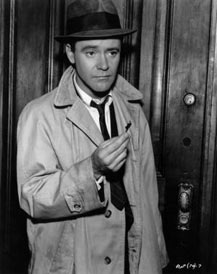
Blu-Ray Special Features Review
The Apartment makes its high-definition debut on Blu-Ray disc. The film is presented in black-and-white and it’s clear that a great deal of effort went into the restoration process. The picture is crisp and clean, which is most noticeable in wider shots when the detail is often muddled on regular transfers (such as standard DVD). Of the older films I’ve watched this month on Blu-Ray (Spellbound and Notorious being the other two), The Apartment easily looks the best.
Along with the feature film (which has no normal Blu-Ray disc menu), there are a couple of bonus features:
Inside The Apartment (29:36) – This is a half-hour documentary that talks about just how a movie as risque and daring as The Apartment came to be. It focuses on director Billy Wilder’s career projects and what kind of impact the filmmaker had on Hollywood. It also features the son of I.A.L. Diamond, one of the film’s writers, and Jack Lemmon’s son Chris, offering insights to the characters and story, as well as their respective father’s works. Wilder and his career is talked about at great length, as well as the reception of the film and the impact it had on movies that followed it.
Magic Time: The Art of Jack Lemmon (12:47) – Jack’s son Chris shares memories about his father and his father’s career in this mini-documentary about the beloved actor. It’s a great addition to this release and perfect for any fan of Jack Lemmon’s work.
To round out the extras, there’s a feature-length audio commentary with Film Historian Bruce Block, as well as a theatrical trailer.
– John DiBiase, (reviewed: 2/7/12)
Parental Guide: Content Summary
![]() Sex/Nudity: Baxter tells us in a narration that he can’t always get into his apartment because it’s being used. We then see a man inside who’s buttoning up his shirt and jacket and a woman in a dress who comes dancing over to him (implying they just had a fling). The man comments on needing to leave and we see them outside as he rushes her along. She asks him if he takes other women up there and he says “Of course not! I’m a happily married man!”; A neighbor comments to Baxter about the “noise” he hears coming through the walls (and makes a comment that some nights are a “double header”). He then tells him to slow down and take it easy; Mr. Dobisch calls Baxter from a bar and asks him to clear out because he met a woman who looks like Marilyn Monroe and begs him to leave so he can make use of the apartment for thirty minutes. Dobisch shows up at the door and ushers her inside the apartment (where Baxter left a note for him not to be too loud); We then hear giggling outside the door as a neighbor overhears and exclaims to his wife that “He’s at it again!” (assuming it’s Baxter, but it’s not); Mr. Kirkeby smacks a woman on the butt while walking out of the elevator. He then complains to Baxter about not being able to get a “tumble” with her and how he’d like to take a long elevator ride with her; Fran and Jeff discuss their past affair over dinner before Jeff takes her back to the apartment; The four men who use the apartment for affairs enter Baxter’s office and complain about not being able to use it lately. Kirkeby complains he had to take Sylvia to the drive-in and that he’s too old for that sort of thing anymore; We see some miscellaneous people making out at an office party; Sheldrake’s secretary tells Fran she once had a “ring-a-ding-ding” with him; Jeff hands Fran a hundred dollar bill for a Christmas gift. She glares at him and then starts removing her gloves and coat. He tells her he doesn’t have any time and must leave and she remarks “Well, I just thought since it was paid for…”; Baxter, while drunk and depressed, brings a date (an obnoxious married woman) back to his apartment with the intentions to sleep with her. He tells her that he is a “notorious sexpot” (but they don’t do anything); We see Fran in her slip getting out of bed.
Sex/Nudity: Baxter tells us in a narration that he can’t always get into his apartment because it’s being used. We then see a man inside who’s buttoning up his shirt and jacket and a woman in a dress who comes dancing over to him (implying they just had a fling). The man comments on needing to leave and we see them outside as he rushes her along. She asks him if he takes other women up there and he says “Of course not! I’m a happily married man!”; A neighbor comments to Baxter about the “noise” he hears coming through the walls (and makes a comment that some nights are a “double header”). He then tells him to slow down and take it easy; Mr. Dobisch calls Baxter from a bar and asks him to clear out because he met a woman who looks like Marilyn Monroe and begs him to leave so he can make use of the apartment for thirty minutes. Dobisch shows up at the door and ushers her inside the apartment (where Baxter left a note for him not to be too loud); We then hear giggling outside the door as a neighbor overhears and exclaims to his wife that “He’s at it again!” (assuming it’s Baxter, but it’s not); Mr. Kirkeby smacks a woman on the butt while walking out of the elevator. He then complains to Baxter about not being able to get a “tumble” with her and how he’d like to take a long elevator ride with her; Fran and Jeff discuss their past affair over dinner before Jeff takes her back to the apartment; The four men who use the apartment for affairs enter Baxter’s office and complain about not being able to use it lately. Kirkeby complains he had to take Sylvia to the drive-in and that he’s too old for that sort of thing anymore; We see some miscellaneous people making out at an office party; Sheldrake’s secretary tells Fran she once had a “ring-a-ding-ding” with him; Jeff hands Fran a hundred dollar bill for a Christmas gift. She glares at him and then starts removing her gloves and coat. He tells her he doesn’t have any time and must leave and she remarks “Well, I just thought since it was paid for…”; Baxter, while drunk and depressed, brings a date (an obnoxious married woman) back to his apartment with the intentions to sleep with her. He tells her that he is a “notorious sexpot” (but they don’t do anything); We see Fran in her slip getting out of bed.
![]() Vulgarity/Language: 3 “h*ll,” 2 “d*mn,” 1 “Oh my G-d,” 1 “Oh G-d”
Vulgarity/Language: 3 “h*ll,” 2 “d*mn,” 1 “Oh my G-d,” 1 “Oh G-d”
![]() Alcohol/Drugs: We see Baxter carrying a bunch of empty liquor bottles that guests as his apartment had finished off; We see a woman drinking in a bar; We see Dobisch carrying three full glasses of wine; Fran and Jeff have drinks in a bar; We see drinking and drunk folks at a Christmas party on the office floor; Baxter is very drunk while sitting at a bar and still drinking; A woman overdoses on sleeping pills; We see a lot of drinking at a New Year’s party; Baxter holds a bottle of champagne that’s overflowing.
Alcohol/Drugs: We see Baxter carrying a bunch of empty liquor bottles that guests as his apartment had finished off; We see a woman drinking in a bar; We see Dobisch carrying three full glasses of wine; Fran and Jeff have drinks in a bar; We see drinking and drunk folks at a Christmas party on the office floor; Baxter is very drunk while sitting at a bar and still drinking; A woman overdoses on sleeping pills; We see a lot of drinking at a New Year’s party; Baxter holds a bottle of champagne that’s overflowing.
![]() Blood/Gore: Baxter has a little blood on his lip after being punched.
Blood/Gore: Baxter has a little blood on his lip after being punched.
![]() Violence: We see Baxter watching TV and flipping through the channels, with almost every channel having westerns showing various degrees of action violence (nothing graphic–just some shooting and bar fights); A woman overdoses on sleeping pills. A doctor repeatedly slaps her in the face while trying to revive her from being unconscious; A man punches another man in the face with two swings, knocking him over.
Violence: We see Baxter watching TV and flipping through the channels, with almost every channel having westerns showing various degrees of action violence (nothing graphic–just some shooting and bar fights); A woman overdoses on sleeping pills. A doctor repeatedly slaps her in the face while trying to revive her from being unconscious; A man punches another man in the face with two swings, knocking him over.
